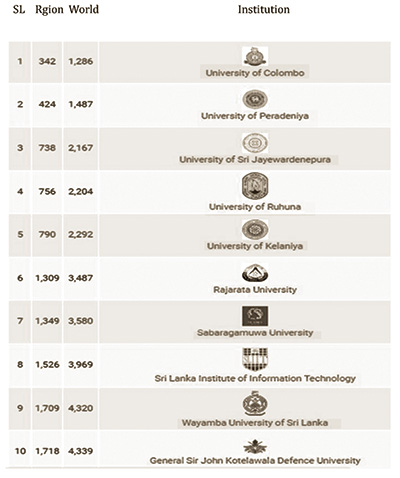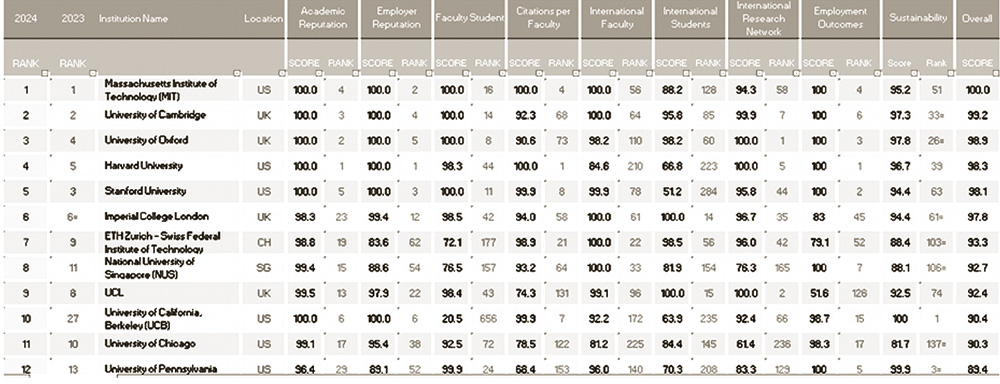Why are SL universities’ positions low in world ranking indices?
 Arespected law firm in New Zealand, when advertising positions for apprentice lawyers, tends to overlook applications from graduates who have not attended top-ranked institutions. Hence, it becomes crucial for universities to achieve international high rankings. Beyond scenarios like job searches, there are several reasons why a higher ranking holds significance for a university:
Arespected law firm in New Zealand, when advertising positions for apprentice lawyers, tends to overlook applications from graduates who have not attended top-ranked institutions. Hence, it becomes crucial for universities to achieve international high rankings. Beyond scenarios like job searches, there are several reasons why a higher ranking holds significance for a university:
https://www.adscientificindex.com/university-ranking/?funding=All+Universities&country_code=lk
Source: https://www.topuniversities.com/world-university-rankings
Prestige, Reputation and Research
A higher rank enhances the prestige and reputation of a university both nationally and internationally. It signifies academic excellence, research prowess, and overall institutional quality, attracting top students, faculty, and researchers. A higher rank provides global recognition and visibility to the university, positioning it as a leader in higher education and research. This recognition opens doors to international collaborations, partnerships, and exchange programmes, enriching the academic and cultural experiences of students and faculty.
Higher-ranked universities tend to have greater research impact and influence. They attract top researchers, secure more research funding, and produce groundbreaking discoveries and innovations that address societal challenges and drive economic growth.
Competitiveness and Attracting Talents
A higher rank increases the competitiveness of the university in attracting funding, grants, and partnerships. Funding agencies, philanthropic organisations, and industry partners are more likely to collaborate with highly ranked universities, leading to increased opportunities for research, innovation, and economic development.
Universities with higher ranks are more attractive to talented students, faculty, and researchers. Top-ranked universities can recruit and retain the best minds in academia, fostering a vibrant intellectual community and facilitating knowledge creation and dissemination.
Higher-ranked universities typically experience higher student enrollment and retention rates. Students are drawn to universities with strong academic reputations, diverse programme offerings, and attractive campus environments, enhancing the university’s revenue and sustainability.
The reputation and network of a higher-ranked university can positively impact the career prospects and success of its alumni. Graduates from prestigious universities often have access to better job opportunities, higher salaries, and influential professional networks, contributing to their long-term success and the reputation of the university.
 Overall, a higher rank serves as a symbol of excellence, attracting talent, resources, and opportunities that contribute to the continued success and advancement of the university. The tables provide global rankings of universities, as well as rankings specific to the South Asian region and Sri Lanka.
Overall, a higher rank serves as a symbol of excellence, attracting talent, resources, and opportunities that contribute to the continued success and advancement of the university. The tables provide global rankings of universities, as well as rankings specific to the South Asian region and Sri Lanka.
Several factors contribute to Sri Lankan universities being ranked low:
Quality of Education and Research: Some Sri Lankan universities struggle to maintain high standards of education and research due to factors such as outdated curricula, inadequate teaching resources, and limited access to modern technologies and learning materials.
Low levels of research output and innovation contribute to the low rankings of Sri Lankan universities. Factors such as limited research funding, inadequate research infrastructure, and a lack of incentives for faculty to engage in research can hinder the production of high-quality research outputs.
Faculty Quality and funding: The quality and professional development of faculty members play a significant role in the rankings of universities. Challenges such as brain drain, where talented academics seek opportunities abroad due to better prospects, and limited opportunities for faculty development and training can impact the quality of teaching and research. Issues related to governance and management, including bureaucratic inefficiencies, lack of transparency, and political interference, can affect the overall functioning and performance of universities.
Sri Lankan universities often face challenges due to limited funding and investment in higher education. Insufficient financial resources can impact infrastructure development, research facilities, faculty recruitment, and student support services. Inadequate infrastructure and facilities, including outdated laboratories, libraries, and IT infrastructure, can hinder the ability of universities to provide quality education and conduct impactful research.
International Collaboration and Recognition: Limited international collaboration and recognition can also contribute to the low rankings of Sri Lankan universities. Engaging in partnerships with international institutions, participating in global research networks, and obtaining accreditation from reputable international organizations can enhance the visibility and reputation of universities.
The role of university administration
The factor of governance and management plays a significant role in influencing the encouragement or discouragement of research publication in quality journals indexed in databases like Scopus or Web of Science.
However, there seems to be a prevailing trend of publishing solely for the sake of meeting publication quotas in local journals that lack indexing, primarily to accumulate points for career advancement purposes.
Bureaucratic Inefficiencies: Inefficient bureaucratic processes within universities can create barriers and delays in the research publication process. For instance, complex administrative procedures for obtaining approvals such as ethical approval, funding, or accessing resources can discourage faculty members from pursuing research or submitting their work to quality indexed international journals. The time and effort required to navigate bureaucratic red tape may outweigh the benefits of publishing prestigious journals.
Lack of Transparency: Universities that lack transparency in their governance and decision-making processes may create an environment where researchers feel uncertain or insecure about the publication process. Without clear guidelines, criteria, and expectations for research publication, faculty members may hesitate to invest time and resources in producing high-quality research or submitting it to reputable journals. Additionally, concerns about favoritism, bias, or arbitrary decision-making in the publication process can undermine trust and confidence among researchers.
Political Interference: Political interference in university governance can have detrimental effects on research culture and academic freedom. When political agendas influence decision-making related to research priorities, funding allocation, or editorial policies, it may compromise the integrity and independence of academic research. Researchers may feel pressured to align their work with political interests or avoid controversial topics that could jeopardize their careers or funding opportunities. In such environments, there may be a tendency to prioritize quantity over quality in research output, with less emphasis on publishing in prestigious journals indexed in databases like Scopus or Web of Science.
Role of the Ministry of Education and the University Grant Commission

The University Grants Commission (UGC) serves as the governing authority for the university system in Sri Lanka, guided by nicely crafted vision, mission, and goals as per their website; https://www.ugc.ac.lk/
The absence of goals focused on “high impact research,” as outlined in the mission statement, highlights a potential gap in the UGC’s initiatives. This oversight may contribute to the lack of emphasis on promoting research publication in high-quality international journals, which is crucial for achieving higher ranks in ranking indices.
Further, in the promotion process for academics to the positions of Associate Professors and Professors, the University Grants Commission (UGC) has issued circulars outlining a point system; UGC Circular No. 723 of 12 December 1997, 869 of 30 November 2005, and 916 of 30 September 2009.
According to these circulars, a senior lecturer in the university system must accumulate 105 points to qualify for the Professor position, with a minimum of 55 points required from Research and Creative work. However, the conditions for claiming these points are relatively lax, requiring only that publications appear in numbered volumes and pass peer review. While there are no restrictions on maximum points, a critical issue remains: there is no minimum requirement for points articles published in globally recognized indexed journals.
Consequently, some faculties of certain universities resort to publishing their own “journals” and organizing “international conferences” to claim points without conducting rigorous research or publishing them in internationally reputed indexed databases.
Crucially, there should be a cap on the maximum points awarded for local publications, even if they are published by “recognized publishers,” a term not clearly defined in the circular. Publishers like Sarasavi, Vijitha, and Gunasena are well-known, yet citations from their publications are not acknowledged by WoS, Scopus or Google, thus not factored into rankings by agencies.
The Way out.
To boost Sri Lankan universities in global rankings, the UGC and Ministry of Education should revise their missions and goals to include more research and internationally recognized indexed publications for universities and ensure clear communication to prospective university staff.
Staff should receive more than just recognition for publications, with rewards such as cash incentives and public appreciation. Making research projects compulsory for undergraduates, postgraduates, and masters, and incentivizing manuscript submissions with marks or cash rewards, could further motivate students.
Conclusions
Overall, addressing issues related to governance and management is essential for fostering a conducive environment for research publication in quality indexed journals. Universities need to streamline administrative processes, enhance transparency in decision-making, and safeguard academic freedom from political interference. By promoting a culture of excellence, integrity, and meritocracy, universities can encourage faculty members to actively engage in research and contribute to knowledge dissemination through publications in reputable indexed journals.
Addressing these challenges requires concerted efforts from various stakeholders, including government authorities, university administrations, faculty members, students, and funding agencies. To elevate Sri Lankan universities in global rankings, the UGC and Ministry of Education should update their missions to prioritize research and internationally recognized publications. Additionally, staff should be rewarded beyond recognition, with incentives like cash rewards and public appreciation. Implementing compulsory research projects and incentivizing manuscript submissions can enhance student motivation at all academic levels.
(The writer, a senior Chartered Accountant and professional banker, is Professor at SLIIT University, Malabe. He is also the author of the “Doing Social Research and Publishing Results”, a Springer publication (Singapore), and “Samaja Gaveshakaya (in Sinhala). The views and opinions expressed in this article are solely those of the author and do not necessarily reflect the official policy or position of the institution he works for. He can be contacted at saliya.a@slit.lk and www.researcher.com)



